

The 'heart attack proof' diet? Woman trades heart surgery for new diet Dr.
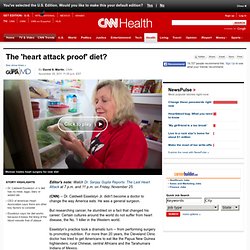
Caldwell Esselstyn Jr.'s diet has no meat, eggs, dairy or added oils CEO of American Heart Association says there are other key factors to considerEsselstyn says his diet works because it keeps the lining of the blood vessels free of plaque Editor's note: Watch Dr. Sanjay Gupta Reports: The Last Heart Attack at 7 p.m. and 11 p.m. on Friday, November 25. (CNN) -- Dr. But researching cancer, he stumbled on a fact that changed his career: Certain cultures around the world do not suffer from heart disease, the No. 1 killer in the Western world.
Esselstyn's practice took a dramatic turn -- from performing surgery to promoting nutrition. Follow his dietary prescription, the 77-year-old Esselstyn says, and you will be "heart attack proof" -- regardless of your family history. The Esselstyn diet is tough for most Americans to swallow: no meat, no eggs, no dairy, no added oils.
Bill Clinton's new vegan diet Ornish: Asking the right health care questions. Carotid Artery Sonogram - a comprehensive view. Carotid artery ultrasound is an effective alternative to more invasive coronary angiography, study finds. New research from NYU Langone Medical Center shows that a simple, inexpensive and noninvasive carotid artery ultrasound of the neck can be used as a preliminary diagnostic tool for coronary artery disease (CAD).
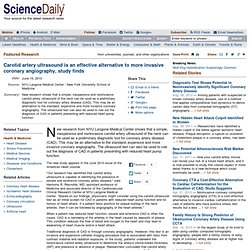
This may be an alternative to the standard, expensive and more invasive coronary angiography. The ultrasound test can also be used to rule out the diagnosis of CAD in patients presenting with reduced heart pump function. The new study appears in the June 2010 issue of the American Heart Journal. "Our research has identified that carotid artery ultrasound is capable of identifying the presence of severe and extensive coronary artery disease," said Harmony R.
Reynolds, MD, assistant professor of Medicine and associate director of the Cardiovascular Clinical Research Center at NYU Langone Medical Center. When a patient has reduced heart function, severe and extensive CAD is often the cause. Coronary calcium beats C-reactive protein for predicting heart attack and stroke risk, study finds. The presence of calcium in coronary arteries is a much better predictor of heart attack and stroke than C-reactive protein among people with normal levels of LDL cholesterol, according to a study of more than 2,000 people led by a Johns Hopkins heart specialist.
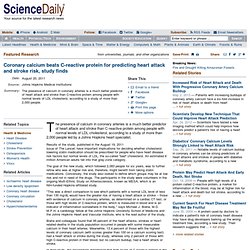
Results of the study, published in the August 19, 2011 issue of The Lancet, have important implications for deciding whether cholesterol-lowering statin medication should be prescribed for people who have heart disease risk factors but normal levels of LDL, the so-called "bad" cholesterol. An estimated 6 million American adults fall into that gray-zone category. The goal of the new study, which followed 2,083 people for six years, was to further refine who was at higher risk and, therefore, might benefit from taking statin medications. Conversely, the study also looked to define which groups may be at low risk and not in need of the drugs. Is Coronary Calcium Better Than CRP for Predicting CV Events? A new study suggests that people with low LDL levels and high CRP levels may benefit from coronary artery calcium (CAC) scans to identify those who are most likely to benefit from statin therapy.
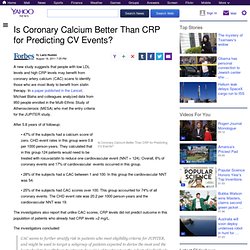
In a paper published in the Lancet, Michael Blaha and colleagues analyzed data from 950 people enrolled in the Multi-Ethnic Study of Atherosclerosis (MESA) who met the entry criteria for the JUPITER study. After 5.8 years of of followup: • 47% of the subjects had a calcium score of zero. CHD event rates in this group were 0.8 per 1000 person-years. They calculated that in this group 124 patients would need to be treated with rosuvastatin to reduce one cardiovascular event (NNT = 124) . • 28% of the subjects had a CAC between 1 and 100. . • 25% of the subjects had CAC scores over 100. The investigators also report that unlike CAC scores, CRP levels did not predict outcome in this population of patients who already had CRP levels >2 mg/L.
The investigators concluded: Debate About Study's Meaning. Gupta: Becoming heart attack proof. Editor's note: Watch Dr.
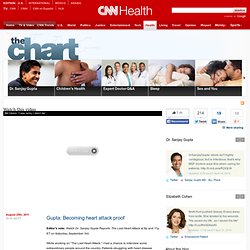
Sanjay Gupta Reports: The Last Heart Attack at 8p and 11p ET on Saturday, September 3rd. While working on “The Last Heart Attack,” I had a chance to interview some extraordinary people around the country. Patients struggling with heart disease provided lessons that can sometimes be taught only after being smacked in the face with their own mortality. For example, I have never seen former President Clinton so candid. He was convinced he was going to die back in 2004, after feeling chest tightness during a flight back to New York on a small plane. I interviewed cardiologists who believe we are so darn close to virtually eliminating heart disease. One day, I had a chance to speak to a couple of those champions candidly while waiting for a shoot to begin - Dr. And, I will admit, while I had trained my whole life to treat disease after it developed, I wasn’t medically trained in nutrition to be able to help prevent some of these diseases in the first place.